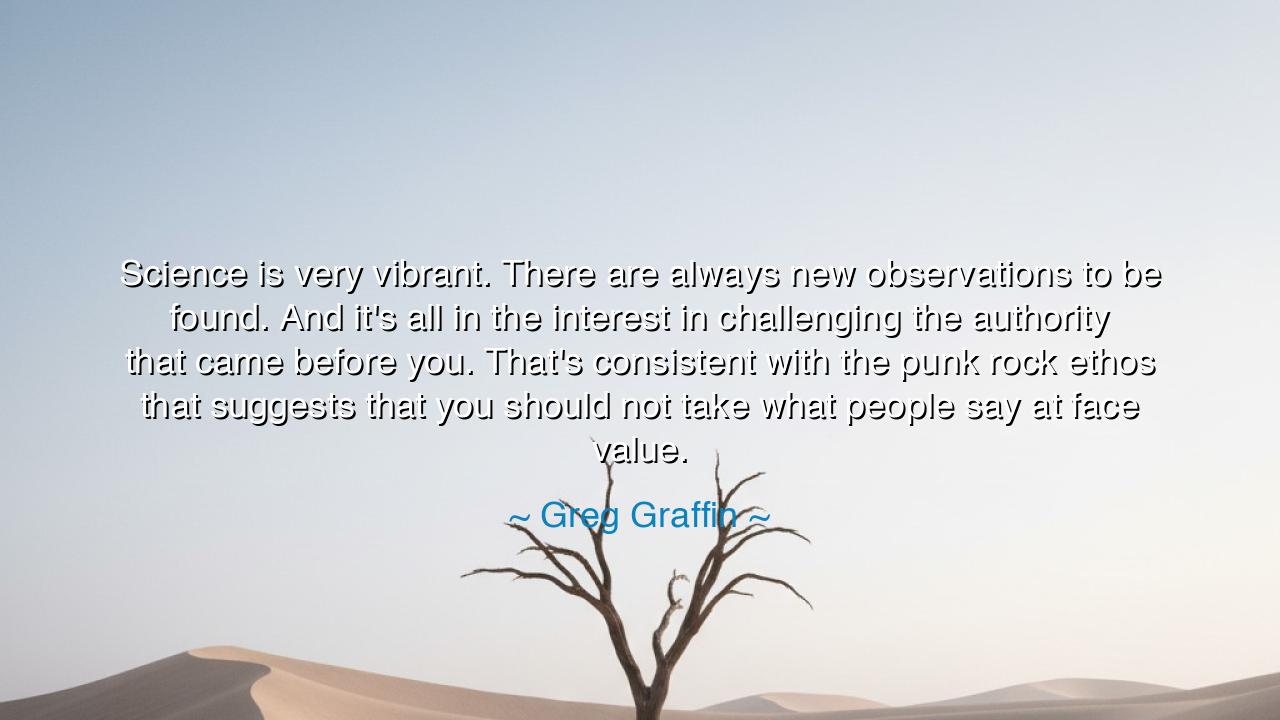
Science is very vibrant. There are always new observations to be
Science is very vibrant. There are always new observations to be found. And it's all in the interest in challenging the authority that came before you. That's consistent with the punk rock ethos that suggests that you should not take what people say at face value.






Hear, O children of the future, for the words of Greg Graffin carry with them a profound truth about the spirit of science and the unyielding nature of curiosity. He said: “Science is very vibrant. There are always new observations to be found. And it’s all in the interest in challenging the authority that came before you. That’s consistent with the punk rock ethos that suggests that you should not take what people say at face value.” These words, though spoken in modern times, echo an ancient and powerful idea: that progress—in both science and life—comes not from blind acceptance, but from the willingness to challenge authority, to question what has been established, and to seek the truth through observation, reason, and inquiry.
What, then, do these words mean, O seekers of truth? Graffin reminds us that science is not a static pursuit, nor is it the domain of those who simply follow the accepted wisdom of the time. Science is vibrant—it is alive, always moving, always evolving. It is through new observations, through questioning the foundations laid before us, that we move closer to the truth. Authority—whether it is the authority of past thinkers, of tradition, or of social norms—must always be open to challenge. This, Graffin suggests, is the punk rock ethos, the spirit of rebellion that refuses to accept things at face value. Just as punk rock rejects the status quo, science demands that we look deeper, that we question what we think we know, and that we are not satisfied with easy answers.
Let us reflect on the story of Galileo Galilei, a man whose challenge to the established authority of his time shook the very foundations of science. In the 16th century, the prevailing belief, rooted in ancient teachings, was that the Earth was the center of the universe. This geocentric model was not just a scientific theory—it was tied to religious and cultural authority. Galileo, with his telescope, challenged this view. He observed the moons of Jupiter and the phases of Venus, evidence that supported the heliocentric model of the universe, proposed by Copernicus. Galileo’s observations, however, were met with fierce resistance from the Church and the scientific establishment. Yet, Galileo’s willingness to challenge authority and seek the truth through observation led to a revolution in astronomy, changing our understanding of the cosmos forever. Just as punk rock rebels against conformity, Galileo rebelled against the established scientific and religious order, driving humanity toward a new understanding of its place in the universe.
In more recent times, the scientific revolution of the 20th century continued this spirit of rebellion. Albert Einstein, with his theory of relativity, challenged the very fabric of Newtonian physics. For centuries, the laws of Newtonian mechanics had been regarded as the ultimate explanation of the universe’s workings. But Einstein’s theory, which proposed that time and space were not absolute but relative, challenged the authority of classical physics. Just as the punk rock ethos rejected the musical establishment, Einstein rejected the established scientific worldview, offering a new paradigm that would redefine our understanding of space, time, and gravity. His boldness in questioning the authority of past thinkers propelled science into a new era.
The lesson, O children, is this: True progress comes not from accepting the world as it is, but from questioning, from challenging, and from seeking the deeper truths that lie beneath the surface. Science is not a mere collection of facts; it is a dynamic process of discovery, of observing, testing, and rethinking. The punk rock ethos that Graffin speaks of is the spirit of rebellion, of disruption, of refusal to accept things at face value. This spirit is the very heart of scientific inquiry. If we wish to grow, to evolve, and to understand the world around us, we must question everything, challenge what we think we know, and embrace the uncertainty that comes with the search for truth.
So, O children, do not fear to question. Do not fear to challenge the authority, whether it be the authority of tradition, of experts, or of societal norms. Look at the world with fresh eyes, and let your curiosity lead you to new discoveries. Whether you seek to understand the natural world, the human mind, or the very mysteries of existence, embrace the spirit of inquiry. Like Galileo, like Einstein, and like the rebels of punk rock, challenge the status quo, for it is only through this that we can uncover the hidden truths of the universe. The world is waiting for those who are willing to ask the difficult questions and to forge new paths through the unknown.
In your journey, remember that the true path of growth and understanding lies in questioning the known and seeking the unknown. Like the pioneers of science, reject complacency, and embrace the restless spirit of rebellion, for it is in this pursuit that we come closer to the truth. Science, like life, is vibrant—always changing, always evolving. And it is through our willingness to challenge, to disrupt, and to question that we become true seekers of knowledge.






AAdministratorAdministrator
Welcome, honored guests. Please leave a comment, we will respond soon